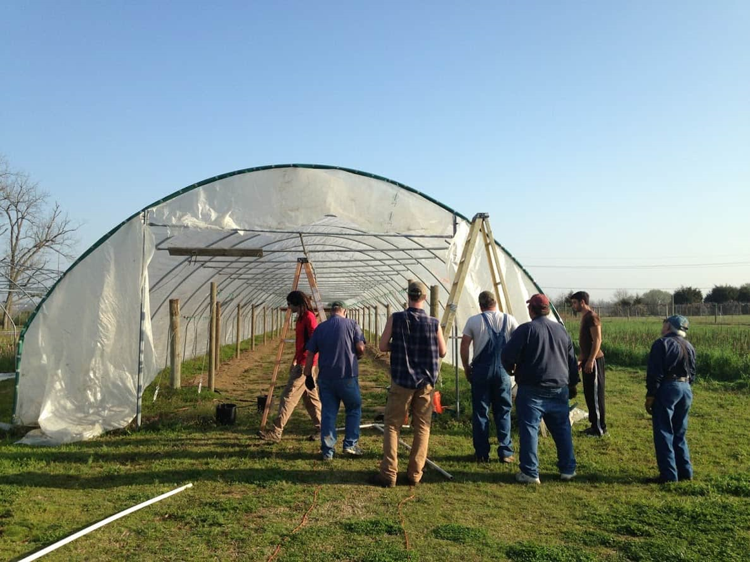Aug 16, 2021High tunnel specialty crop growing offers benefits
High tunnels, sometimes called hoop houses, offer northern New York market growers an easy way to extend our limited growing season by two or three months. Sometimes more. Farmers can grow early and/or late crops of cool weather and salad vegetables even while there’s snow on the ground.
And depending upon the weather, warm season crops, like tomatoes, can mature several weeks earlier and be harvested and sold many weeks after similar field grown crops have been killed by frost.
In addition, high tunnels offer protection from wind, driving rain, disease, insects, and deer. And more than a decade of Cornell University-conducted research has shown that the yields and quality of produce grown in high tunnels can be far superior to that of comparable field-grown crops.
This is great news for consumers too, who gain access to an ever-increasing variety and supply of top-quality, locally-grown fruits and vegetables, both earlier and later in the year.
High tunnel-grown vegetables
In northern New York, spinach can be planted in high tunnels in September for harvest in November and even December. And those plants will, with protection, overwinter and resume growth in late-February / early March for late winter and early spring harvests.
Well-trained and properly-pruned tomatoes thrive in the protected conditions presented by high tunnels. Growers find it easier to provide better air circulation and optimum light penetration. And, since excess foliage can be removed to focus plant energy on producing and ripening fruit, plants are easier to work around and produce higher yields than similar field-grown tomatoes.
Cucumbers are another excellent choice for northern New York high tunnel production. They can be very fast-growing and yielding in spring, summer, and fall, especially when vertically-grown; which takes full-advantage of the space and light offered.
Using high tunnels for small fruit production
Using high tunnels for raspberry production can extend the season from as early as May, for some floricane-fruiting (summer-bearing) cultivars, to as late as November, for some primocane-bearing (late-season) varieties. And primocane-bearing plants typically yield more than three times as much fruit in tunnels than in the field, due to the extended harvesting season and, among other things, larger berry size, closer row spacing, and reduced occurrence of gray mold infection. The end result is premium-quality fruit and higher crop value.
Growing tree fruit in a north country high tunnel
For many years, the U.S. Department of Agriculture’s Natural Resources Conservation Service (NRCS), through their Environmental Quality Incentives Program (EQIP), has provided financial and technical assistance to Northern New York market growers looking to extend the growing season for high-value crops in an environmentally safe manner. The program is ongoing.
One area farm served by that program was Summit Farm; located southwest of Malone in the foothills of the Adirondacks. And while they continue to use their high tunnels to extend their growing season and increase production, they’ve taken things one step further. They’ve been propagating crops that are commonly considered unsuitable for the region.
You don’t see too many peach trees growing in the North Country. That’s because we’re outside of their generally accepted geographic growing range. Even if the trees survive our sub-zero temperatures, high winds, snow, and ice (and, in some locations, they do), the fruit buds are damaged at temperatures around 28°F, which often happens during spring frost events. In other words, they don’t bear fruit.
But what if you planted and grew peach trees in an environment that protected them from springtime frost events, when the flowers are blooming and at risk. That’s exactly what the husband-and-wife team at Summit Farm wanted to find out, when they decided to use one of their high tunnels for growing stone fruits, including peaches, which are fairly fast-growing trees. Their trees are now 6 years old, 10-12 feet tall, healthy, and bearing delicious, high-quality fruit.
Taking it to the limit
Interior Alaska has long, cold winters and short, often unpredictable summers. Most of the state lies in planting zones 1 (-50°F or lower) or 2 (-40°F to -50°F). Food costs are high. And fresh fruit and vegetables are often unavailable in rural Alaskan villages, where often, the only way to deliver them is by plane.
For more than a decade now, researchers from the University of Alaska (UA) Fairbanks Experiment Farm and UA Cooperative Extension have been studying the viability of producing tree fruit (apples, not peaches) and other agricultural commodities in high tunnels locally, in the sub-polar Alaskan climate. In trials where apple trees were grown both outside and inside high tunnels, most varieties were able to grow outside. But they seldom flowered and none produced fruit.
Trees growing in tunnels, however, exhibited greater overall size and they flowered as early as the second week of May into early June. When the fruit was adequately thinned, they produced consistent harvests of good size, high-quality fruit. Not thinning adequately often resulted in trees that produced heavily one year and not at all the next.
Online course offered
Cornell Small Farms offers an online course focused on season extension with high tunnels. The course instructor is retired Eastern NY Extension Vegetable Specialist, Amy Ivy, who worked with CCE, in our region, for 31 years. For more information, visit smallfarmcourses.com/p/bf-220-season-extension-with-high-tunnels
Richard L. Gast, Extension Program Educator II: Horticulture, Natural Resources, Energy; Agriculture Programs Assistant (retired); Cornell Cooperative Extension of Franklin County. 355 West Main St., Suite 150, Malone, 12953. Call 483-7403, fax 483-6214 or email [email protected].
– Richard Gast, Cornell Cooperative Extension
Putting the finishing touches on a high tunnel. High tunnels offer protection from wind, driving rain, disease, insects, and deer. And more than a decade of Cornell University-conducted research has shown that the yields and quality of produce grown in high tunnels can be far superior to that of comparable field-grown crops. Photo: Susan Alman/University of Arkansas

















